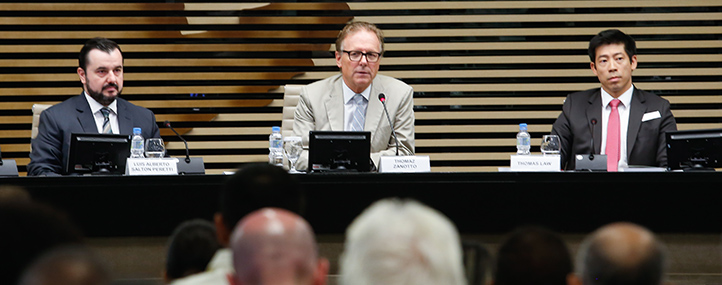Chamber Ciesp/Fiesp discusses business opportunities and the resolution of disputes with Chinese
February 20, 2019
On February 20, 2019, the Chamber of Conciliation, Mediation and Arbitration Ciesp/Fiesp (Chamber Ciesp/Fiesp) hosted the Seminar “Doing Business and Resolving Disputes with China”, with the support of the Brazil-China Sociocultural Institute (Ibrachina) and the Pontifical Catholic University of São Paulo (PUC-SP).
In the opening panel, Thomaz Marinho de Andrade Zanotto, Director of the Department of International Relations and International Trade (Derex) of Fiesp bid welcome on behalf of the President of Ciesp and Fiesp, Paulo Skaf. He explained the importance of the Brazil-China trade relationship, as well as the initiatives led by Fiesp in order to promote the industries of São Paulo in this context and, hence, the importance of arbitration as a tool to resolve international trade disputes. Thomas Law, president of Ibrachina, commented on the efforts of that institution in order to promote a better understanding between Chinese and Brazilian parties. Luís Peretti, Chamber Ciesp/Fiesp’s Secretary-General, explained the ways in which arbitration can be useful in order to resolve disputes between companies located in different countries. He also described Chamber Ciesp/Fiesp’s experience in the management of such disputes, placing it at the disposition of the attendees in order to assist in the resolution of conflicts with foreign partners through arbitration and mediation.
 Câmara de Conciliação, Mediação e Arbitragem Ciesp/Fiesp realiza encontro com foco em negócios e disputas com a China. Foto: Karim Kahan/Fiesp
Câmara de Conciliação, Mediação e Arbitragem Ciesp/Fiesp realiza encontro com foco em negócios e disputas com a China. Foto: Karim Kahan/Fiesp
In the main panel, moderated by Napoleão Casado Filho (PhD from PUC-SP, coach of the arbitration teams of PUC-SP and UNIPE and partner at Clasen, Caribe & Casado Filho Advogados), was divided in two moments: first, the speakers discussed business opportunities with China and then the best ways to prevent and resolve potential disputes.
As regards the business opportunities with China, Alan do Amaral Fernandes (President of Haitong Investment Bank of Brazil S.A.) explained the projects that his institution that relate with Chinese investments in Brazil and discussed the outlook for this relationship, emphasizing the Chinese dependence on imports in order to ensure the food safety of its population. He also described the most researched sectors for Chinese investments and indicated the opportunities in each sector. Following suit, Diogo Castro e Silva (Managing Director of Fosun Investments) analyzed the way China takes part in the process of economic globalization, evoking the historic roots of a civilization that for large periods of its history resisted exchanges with foreign parties, but that has decided to open up in order to develop its economy. Both speakers highlighted the importance of the process of modernization that Chinese economy and consumption patterns spurred by social networks and electronic payment systems.
As regards the legal structuring of events, Armando Rovai (law professor, lawyer and arbitrator in São Paulo, ex-president of the Board of Trade of the State of São Paulo and former National Secretary for the Consumers) indicated several improvement opportunities in the Brazilian legal framework that would facilitate welcoming foreign direct investment. He posited that arbitration yields positive results in order to resolve disputes between Brazilian and Chinese parties and argued that Brazilian statutes must be revamped in several aspects. Subsequently, Guilherme Rizzo do Amaral (partner at Souto Correa Advogados and member of the International Chamber of Commerce Belt and Road Commission) shared his experience regarding the resolution of disputes with Chinese parties through arbitration. He commented what would be the best choices in order to organize the arbitration procedure, discussing, among other things, the choice of the applicable law, of the seat and of the arbitration institution. He then described the Chinese government’s Belt and Road initiative and the efforts of the International Chamber of Commerce in order to adapt to this process.
After the closing of the event, Armando Rovai launched the book “Current Topics in Brazilian Business Law” (published in Portuguese: “Atualidades do Direito Empresarial Brasileiro”), which offers explanations about the Brazilian legal system to the potential investor and includes abstracts in mandarin for the reference of Chinese parties.
Voltar